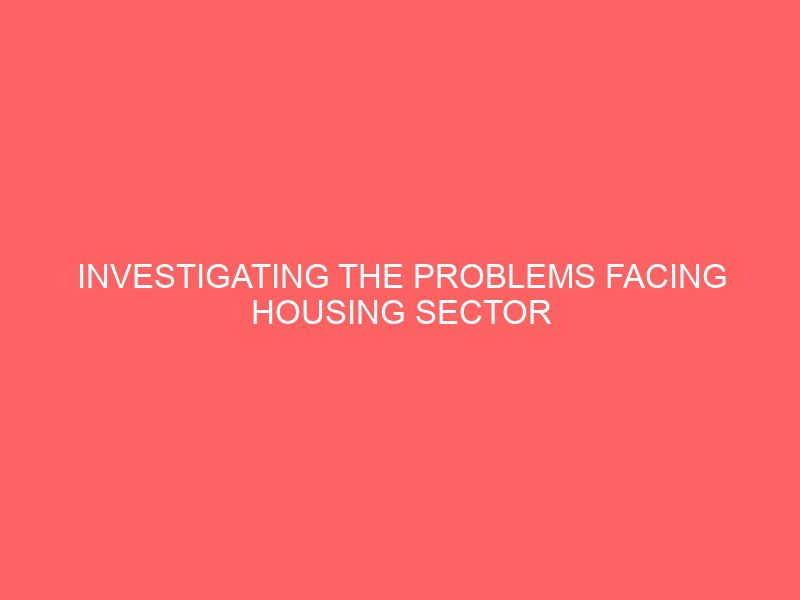Description
CHAPTER 1
INTRODUCTION
1.1 Background of the Study
This research is on Investigating the problems facing housing sector in Nigeria. The dream of each Nigerian citizen is to own his own house (Alhwish, 2010). However, economic Problems began to arise in Nigeria some years ago that have made this dream very difficult to achieve. These problems are complicated, so each specialist in the field of housing and construction holds a unique opinion regarding the main causes of the problems. The main obstacle that consumers face at present is the drastic increase in housing and construction prices in the mega cities of Nigeria. The present study focuses specifically on housing and construction in Abuja.
Nigeria’s main source of revenue is the production of oil. Now that Nigeria’s federal capital territory is receiving a great influx of residents, construction and housing has become the country’s major field in the country’s economy after the oil field Badran (2012).
The growth of this field has come with a sudden rise in the prices of construction and housing, especially in Abuja. This increase has been so problematic that “The prices of construction materials are the next crisis of the Nigerian real estate market” (Alhwish, 2010). The causes of these high prices have yet to be investigated, and they could be numerous and intertwined.
1.2 STATEMENT OF THE PROBLEM
The demand for more construction of all types, coupled with a tight income supply has provided the construction industry with a big challenge to high cost of housing and building construction.This substantial increase has brought disinvestment in the construction industry and added investment risks. One of the main problems of the construction and housing industry may be attributed to the influence of the country’s main industry, oil. Badran (2012) observed, “Expectations of rising prices of building materials are in line with the rise of oil.” As the oil price increases it creates more problems, and these problems, in turn, increase the construction and housing prices even more. Therefore, the relationship between high oil prices and problems in the housing and construction industry is positive (directly proportional).
Other challenges include the high demand for development of public works projects, such as schools, hospitals, and infrastructure, the high demand for housing and construction by Nigerian citizens, The Low supply of housing (Nigeria economic survey, 2012).The manipulation and monopoly of suppliers of cement, steel and other construction materials, Corruption in monitoring government projects, The existence of a black market ,The high inflation of rate, Contractors who are taking projects beyond their capacity, the Speculative purchase and corruption in selling undeveloped lands.
1.3 AIM AND OBJECTIVES
The aim of this study is investigate on the factor that leads to high cost of housing construction in Nigeria.
The objectives of the study are as follows:
- To investigate the critical factors that leads to a drastic increase in housing and construction prices in F.C.T Abuja.
- To determine the problems affecting construction cost in Nigeria.
- To determine the factors that would help government in addressing the major
1.4 RESEARCH QUESTIONS
The following are the research Question that will guide the study:
- What are the main factors that lead to high cost of housing construction in the Federal capital territory, Abuja?
- What are the effects of the factors in housing construction industry?
1.5 SCOPE AND LIMITATION OF THE STUDY
The scope of this research is limited to investigation of essential factors that lead to high cost of housing construction and proffering solutions on how to reduce construction cost in Nigeria.
The study is limited to projects in the F.C.T Abuja Nigeria because there is easy access of information in the Abuja by the researcher.
Target respondents for this study are the principal actors in the construction industry namely: the Client, the Consultant and the Contractor.
The present study is about the current situation in Abuja, Nigeria. In addition, the study is focus only on residential buildings (houses and apartments).
1.6 PURPOSE OF THE STUDY
Nigeria suffers from deep problems that underlie housing and construction
Companies, so this thesis aspires to reveal the main hidden factors of these problems. One of the reasons is population growth. Specifically, the average age in Abuja is a mere 18years. Moreover, Nigeria’s population growth rate is 2.90 % (Central Department of Statistics and Information, 2012). Oil prices also seem to be an enormous factor, because a higher oil price will make everything else cost more, such as transportation of personnel, shipping of materials, manufacturing and so on. Another factor is the underlying economic problems, such as inflation. In addition, government projects, such as subsidized schools and hospitals that help to cover the high population growth, seem to be contributing to higher prices. Likewise, a greater number of projects for public works might be another factor.
The aforementioned factors, among others, have led to a 200% increase in the housing construction cost.
1.7 RESEARCH HYPOTHESES
By examining the literature, the researcher has extracted the factors that could be behind the high cost of housing construction prices. The analysis of these factors has been conducted using a survey. The following factors have been identified and the main hypothesis is that they all contribute to the rise in housing construction cost.
1) Rise in Oil Prices: The increase in world oil demand in the past ten years, nearly 50 percent increase, led to the rapid increase in oil prices.
2) High Demand for Housing Construction: This category includes high demand from, a) Nigeria’s citizens, b) government housing projects and c) government public projects.
3) Low Housing Supply: This category includes the increase of annual demand for housing units and the low supply of housing units.
4) Speculative Purchase of Undeveloped Lands: This category includes corruption in the selling process of undeveloped lands.
5) High Inflation Rate: This category includes the continuous increase in construction materials regarding the inflation factor.
6) Other Factors, such as: the absence of government’s role in monitoring prices, corruption in monitoring government projects, and contractors who take projects beyond their capacity.
1.8 RESEARCH METHODOLOGY
The survey intends to adopt:
1) The methodology of identifying the factors.
2) How to identify the experts who could help complete the survey.
3) The appropriate methods to analyze the data.
In addition, certain factors were evaluated and analyzed to identify the key factors of cost increase in housing and construction industry in Nigeria. The factors that were analyzed include economic, geographic, demographic, social, and other environmental factors to provide accurate and reliable information regarding the cost rise in Nigeria’s construction industry. In the end, some strategies are proposed to help Nigeria’s construction industry reduce its construction and housing costs.
1.9 METHOD OF DATA COLLECTION
Data for the purpose of this study will be collected through primary a source, that is through the use of questionnaires’ as well as secondary sources like: Journals, articles and financial reports.
1.10 METHOD OF DATA ANALYSIS
Frequency and percentages were used for the descriptive data, while mean and standard deviation were use for data analysis.







